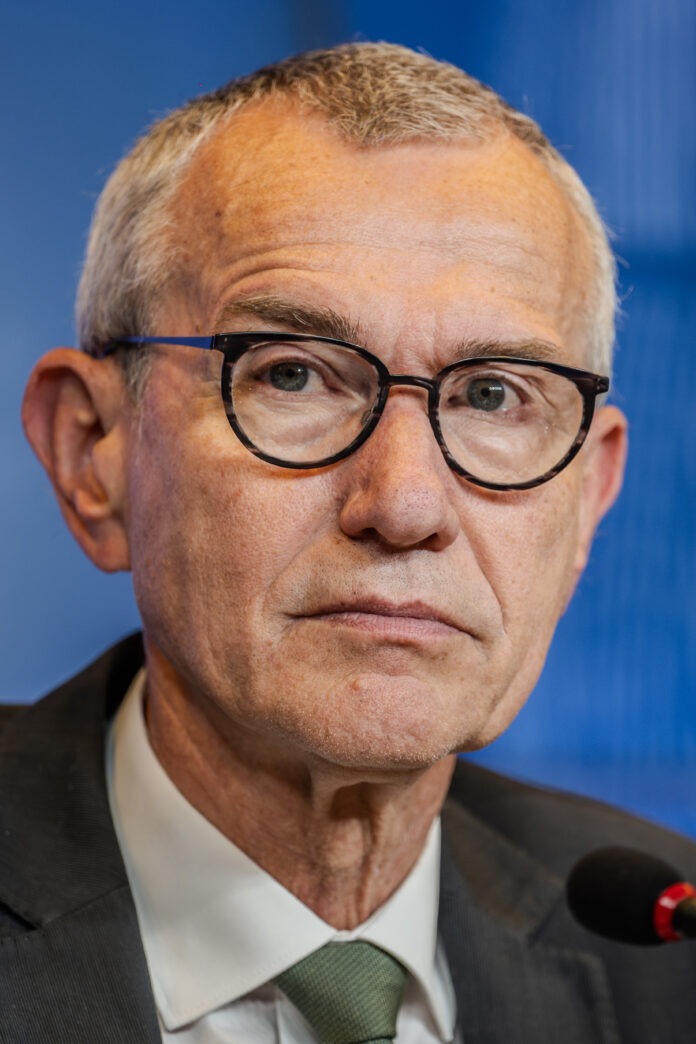
A cornered welfare state may make some authoritarian moves
At the end of last month, Friedrich Merz, the Chancellor of Germany, Western Europe’s leading economy, stated bluntly at a conference of his Christian Democratic Union party that “the welfare state that we have today can no longer be financed with what we produce in the economy.” According to the Wall Street Journal, he thereby expressed “the Unspeakable”, a “taboo in modern Western democracies: admitting that the size of the modern welfare state is no longer affordable.”
Merz thereby called for a “fundamental reassessment” of the benefits system, something which immediately drew criticism from his social democratic coalition partner SPD.
German social spending hit a record €47 billion in 2024 and is projected to rise further in 2025, but the country’s economy is declining. GDP has contracted by 0.3 per cent in 2023 and 0.2 per cent in 2024, following the failure of large-scale experiments with energy supply and an end of cheap Russian gas provision.
Merz is doing what no one else seems willing to do, which is broach the fundamental dilemma of the West. Nations have built welfare states that are so large they have outstripped the ability of slow-growing economies to pay for them.https://t.co/nCnXqm5Ccg
— Wall Street Journal Opinion (@WSJopinion) August 26, 2025
France
Also in France, reckoning day is arriving. French Prime Minister François Bayrou is engaging in desperate attempts to get support for saving nearly €44 billion through spending cuts and a freeze on social benefits, all “to ensure that France can choose the path out of excessive debt.” Notably, abolishing two of the country’s 11 public holidays is also planned.
Even if these measures would be passed, France’s budget deficit would only reduce from 5.4% of GDP in 2025 to 4.6% in 2026. That is not only in violation of EU budget deficit rules, but also makes it harder for the country to avoid its public debt spiraling out of control. France has not had a budget in balance since 1974, but in recent years, its budget deficit has worsened, in contrast with Italy’s. As a result, the yield gap between French and Italian 10 year bonds has narrowed to its tightest level since 2005.
On TV, PM Bayrou has exclaimed that France’s debt has been accumulated to guarantee the “comfort of the boomers” at the expense of the next generation. Macron, seen by many as a “reformist”, has not achieved much. Half of the French debt accumulated under his presidency can be attributed to pensions. Over the last decade, the French public debt to GDP ratio has also increased from 90 to 120 percent of GDP, while the eurozone average has remained relatively stable at 90 percent.
France’s taxation burden is among the highest in Europe, so there is a good question to ask whether even higher taxes are still feasible.
France has done nothing to stabilize its fiscal deficit & debt/GDP. It already has the highest tax burden in Europe, higher taxes would throttle growth potential even more. With its political paralysis it won’t cut spending neither. Next confidence vote is coming. Good luck Euro. pic.twitter.com/fBpApkgfCn
— Michael A. Arouet (@MichaelAArouet) August 26, 2025
Belgium
In neighbouring Belgium, taxes are even higher. In no other OECD country is the tax burden on employed single childless people as high as in Belgium, where more than 50% of a gross salary is skimmed off by the state, according to OECD data. To get to this figure, not only income taxation but also employee and employer social security contributions (minus cash benefits) are taken into account. Germany is in 2nd place, with 47.9 percent, followed by Austria, France and Italy respectively. In the Netherlands, the figure is only 35.1 percent, suggesting that it is possible to have a welfare state without a crushing tax burden.
To be able to reduce taxes, and generate economic growth, politically painful reforms are needed however. In the case of Belgium, that means introducing reform to the social security budget, which provides for health care insurance, disability and sickness benefits as well as unemployment benefits.
The new government led by the centre-right Flemish nationalist PM Bart De Wever, a ragtag coalition of centre-right and leftist parties, which entered power early 2025, has agreed to introduce all in all modest changes to pension benefits, which form the heaviest burden on Belgium’s welfare state, due to the ageing of the population. The health care budget remains de facto ring-fenced, however, as it has been for years. In fact, in percentage of GDP, Belgian public health care spending has effectively doubled since the early 1970s, from around 4 percent of GDP then to around 8 percent today. This increase is much bigger than other social spending.
Vandaag staking van de artsen, maar de echte hervormingen in de gezondheidszorg moeten nog beginnen…
Zonder ingrijpen lijken we op termijn op weg naar 33 miljard aan extra jaarlijkse zorguitgavenhttps://t.co/Iww5E0LUt3 pic.twitter.com/UmF9FpuYFu— Bart Van Craeynest (@Bvancraeynest) July 7, 2025
Healthcare
Belgium’s healthcare system is a good case in point to highlight the challenges of European welfare state. It has a good reputation, but it is in dire financial straits. To deal with this, leftist politicians now aim for greater state control over its functioning, while continuing to pump ever more money into it. During the coalition negotiations, Belgium’s federal health care Minister, Frank Vandenbroucke, a socialist, negotiated that health care spending will be allowed to grow with an average annual 2.5 percent above inflation. The question is whether this is sustainable, as this year, Belgium’s federal and regional governments are on track for a combined 35 billion euro budget deficit, which amounts to around 6 percent of the country’s 570 billion euro GDP. Extra defence spending and the interest rate burden on the country’s 106 percent of GDP public debt burden are major challenges here.
Rumour has it that Vandenbroucke was instrumental to secure the coalition. This is a tour de force, given Belgium’s political landscape, which is divided not only alongside ideological lines but also alongside linguistic lines. Socialist, liberal, green and Christian democrats each have their own political party for both the Dutch speaking Flemish 60 percent of the population and for the Francophone 40 percent. As a result, over the last fifteen years, Belgium has witnessed long periods where it was not possible to form a government.
Exploiting this, Vandenbroucke managed to secure money for his department. He however went further than this. He also secured concessions to be able to introduce more central planning in Belgium’s health care system, which traditionally has always relied on a large private sector element, which is also the reason why its performance has always been relatively good.
To be fair, Vandenbroucke’s stated aim is to implement savings. There are definitely lots of instances where healthcare spending is happening inefficiently. In Belgium, there are for example twice as many PET scanners per capita as compared to the average in the most prosperous European countries. Organisations like the OECD and the European Commission have suggested that potential savings of 20 per cent are feasible.
More control
The Health Care Minister’s proposed method to find savings through greater state control has however provoked a massive backlash from the medical sector itself. In early July, for the first time in two decades, a general doctors strike was called. In particular, doctors complain about his plans to further regulate what they can charge to patients. Due to the problematic financial situation of Belgian hospitals, these sometimes require doctors to provide them with some of the top-up fees doctors are allowed to charge to patients in return for a private hospital room. As a result, also hospitals have expressed concerns that such plans may further trouble their finances.
Some other concerns are that Vandenbroucke is grabbing more power for the government to suspend the licenses of doctors, that he refuses to introduce austerity for state affiliates which play a role in health care provision, and that he is merely going after the relatively high salaries of certain medical professions, like specialist doctors or dentists. Another complaint is that he is unwilling to even consider letting patients pay a bit more to see general practitioners.
Also dentists are angry, as Vandenbroucke wants to permit patients not to pay for dental services directly, so dentists will become dependent on the government’s discipline to pay those bills, which are otherwise refunded to patients. There were quite some delays with this in the past, so it is understandable that they are concerned. In the 2025 coalition deal, Vandenbroucke secured to be able to also apply this “third-party payer system” system to physiotherapists and logopedists. Vandenbroucke already served as health minister in the previous, leftist government, and one of his policies in 2023 contributed to dentists denying poorer patients, as they had been banned by him from asking prices that cover the bare cost of certain medical treatments. Then, dentists expressed sadness about having to refuse these patients.
A key complaint is that the Minister refuses to properly listen. Nikolas De Meurechy, a doctor active in the debate, has lashed out at him, stating : “The Minister drives nearly the entire (dental) medical community up the wall with his totalitarian bill. He claims to want consultation and to value doctors’ opinions. He sets a two-week deadline for comments. He fails to show up for consultation or receiving comments. So he really does not want any consultation.” Patrick Emonts, President of the largest doctors union, ABSyM-BVAS, has flatly warned that Vandenbroucke’s plans “lead us to an authoritarian system.”
In sum, in response to financial constraints, largely caused by government distortions of market functioning in the medical system, the Belgian federal health minister pushes for more central planning in order to mend the problems caused by earlier rounds of government intervention.
During this process, the Minister does not make much of an effort to improve the functioning of its own bureaucracy. In Belgium, the government outsources the task to pay out refunds for medical costs to “mutual insurers”. These receive a sum amounting to more than 3 percent of the 40 billion euro health care budget to perform this task, something often challenged as disproportionate. At the end of June, also these entities have however protested against Vandenbroucke’s approach, together with hospitals and healthcare providers, complaining in a joint stance that he refused to make any changes “despite lengthy discussions.” It is telling that even semi-state entities resist politicians that are craving for more control.
The ECB to the rescue?
What to expect next? The tragedy is that most Western European welfare states are now part of the eurozone. That means that their capacity to burden citizens with unsustainable debt levels has greatly increased.
Since the European Central Bank committed in 2012 to do “whatever it takes” to save the euro, which was understood as creating as much money as necessary to keep interest rates low, the likes of Italy, France and Spain have seen their government gross debt to GDP sharply increase. Yes, public debt levels in the Netherlands and Germany have slightly decreased, but given Germany’s troubling economic situation, it is unlikely that there will be much political willingness to provide yet another round of eurozone emergency bailout transfers.
The biggest mistake the Euro zone made is to allow the high-debt South to tie survival of the Euro to "solidarity" for its debt overhangs. That's incentivized reckless fiscal policy and will only end when the Euro zone allows defaults in places that refuse to govern responsibly. pic.twitter.com/in1qIkX8zb
— Robin Brooks (@robin_j_brooks) August 29, 2025
This means that most of the burden will fall upon the ECB – as always – to keep the ship steady. It will use the oldest trick in the book in public finances, perfected by banana republics: create ever more money – or allow banks to do so, to suppress interest rates, to allow governments continue with unsustainable spending patterns.
Politicians in the eurozone may therefore well be able to continue making unsustainable promises to voters, who will obviously ultimately foot the bill for all of this, as the value of their savings is being depreciated. As they will continue to find out, there is no such thing as a free lunch.












